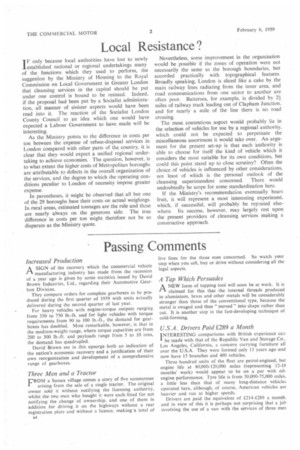Local Resistance?
Page 38

If you've noticed an error in this article please click here to report it so we can fix it.
I F only because local authorities have lost to newly established national or regional undertakings many of the functions which they used to perform, the suggestion by the Ministry of Housing to the Royal Commission on Local Government in Greater London that cleansing services in the capital should be put under one control is bound to be resisted. Indeed, if the proposal had been put by a Socialist administration, all manner of sinister aspects would have been read into it. The reaction of the Socialist London County Council to an idea which one would have expected a Labour Government to have made will be interesting.
As the Ministry points to the difference in costs per ton between the expense of refuse-disposal services in London compared with other parts of the country, it is clear that they would expect a unified regional undertaking to achieve economies. The question, however, is to what extent the higher costs of Metropolitan boroughs are attributable to defects in the overall organization of the services, and the degree to which the operating conditions peculiar to London of necessity impose greater expense.
In parentheses, it might be observed that all but one of the 29 boroughs base their costs on actual weighings. In rural areas, estimated tonnages are the rule and these are nearly always on the generous side. The true difference in costs per ton might therefore not be so disparate as the Ministry quote. Nevertheless, some improvement in the organization would be possible if the zones of operation were not necessarily the same as the borough boundaries, but accorded practically with topographical features Broadly speaking, London is sliced like a cake by the main railway lines radiating from the inner area, and road communications from one sector to another are often poor. Battersea, for example. is divided by 21 miles of railway track leading out of Clapham Junction, and for nearly a mile of the line there is no road crossing.
The most contentious aspect would probably lie in the selection of vehicles for use by a regional authority, which could not be expected to perpetuate the miscellaneous assortment it would take over. An argument for the present set-upis that each authority is able to choose for itself the kind of vehicle which it considers the most suitable for its own conditions, but could this point stand up to close scrutiny? Often the choice of vehicles is influenced by other considerations, not least of which is the personal outlook of the cleansing superintendent concerned. There would undoubtedly be scope for some standardization here.
If the Ministry's recommendation eventually bears fruit, it will represent a most interesting experiment, which, if successful, will probably be repeated elsewhere. Its success, however, may largely rest upon the present providers of cleansing services making a constructive approach.




























































































































